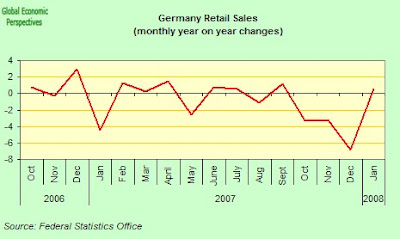Perhaps the clearest indication that the French economy may not be holding up as well as it was is to be found in the latest reading for France on the EU Economic Sentiment Indicator. France reported a deterioration in confidence, down to 105.2 in February from 107.0 in January.

Consumer confidence in France also fell to a record low in February as the fastest inflation in 12 years squeezed purchasing power. A gauge of consumer sentiment fell to minus 35, the lowest since the index was introduced in 1987, from minus 34 in January, according to the latest data from Insee, the Paris-based national statistics office.

More than 80 percent of French people said they saw their purchasing power decline in the last 12 months, according to a poll by Paris-based Ifop institute. That is up from 65 percent in November and from 59 percent in January 2007.
The sub component measuring consumers' sentiment about their current standard of living declined to minus 68 from minus 65, the INSEE report showed, while the sub-index evaluating the outlook for living standards rose to minus 42 from minus 44. The personal financial situations component was unchanged at minus 25. The report showed more people may delay big purchases as that component fell to minus 26 from minus 24.
People are evidently worried about rising prices, and President Nicolas Sarkozy, who made purchasing power the centerpiece of his presidential campaign, is facing his lowest popularity rating since he took office in May.
Consumer prices climbed by an annual 3.2 percent in January, according to the European Union-harmonized index, up from 2.8 percent in December and the fastest since the statistics office began reporting the data in 1996.

Food costs jumped 4.2 percent in January, compared with a 3.1 percent increase in the prior month. Meanwhile, oil prices surged to a record above $102 a barrel last week as the dollar fell below $1.50 against the euro for the first time.
Obviously all of this is causing quite a fuss in France, and a study by the Institut National de la Consommation published last week showed French supermarket food prices are rising faster than raw-material costs. The Paris-based consumer group found the biggest price jumps were for baby milk, pasta, ham and yogurt, which climbed between 40 percent and 48 percent in the six weeks to Jan. 9, based on a survey of 1,055 food prices on the Web sites of five of France's biggest chains.
That this uptick in inflation is bound to give all policymakers a major headache was perhaps underlined by the recent admission by French President Nicolas Sarkozy, who has been one of Jean Claude Trichet's strongest critics, that accelerating inflation in France "worries me". So it should do, and especially since it is seriously going to restrict the hands of policymakers over at the ECB.
Prime Minister Francois Fillon said during the week that the French government is investigating food-price increases and suppliers' profit margins, but Insee's consumer report showed consumers are not particularly reassured by government promises or by the firm ECB stance at this point, since they anticipate that inflation may continue to accelerate with the component for price expectations dropping to minus 23 from minus 11.
To some extent these concerns by French consumers are also borne out by the latest data for French producer prices also released by INSEE this week. French producer prices rose 0.5% month-on-month in January, up from a revised 0.1% rise in December. Producer price inflation for December was revised down from 0.2% initially estimated. Producer prices rose more than the 0.4% increase expected for January. On an annual basis, producer prices climbed 4.9% in January, while economists were looking for 4.8% growth.
Industrial producer prices, excluding energy and agri food, were up 0.5%, following a 0.1% fall in December. The annual growth in the index stood at 1.6%. Industrial import prices gained 0.4%, after recording 0.4% fall in December. Over the last year, import prices rose 4.6%. Excluding energy and agri food, import prices increased 0.4% month-on-month and decreased 0.5% from the prior year. What is, I suppose, most disturbing about this whole picture is the way in which some inflation components are accelerating even as the euro continues to reach ever newer highs, which should, in principle, be serving to slow inflation.

Not everything coming out of France this week has been unequivocably bad news though, since the retail sales purchasing managers index shot up in February.

In fact French retail sales advanced the most in 20 months in February, driven by declining unemployment (another piece of positive news) and seasonal discounts, the NTC Economics compiled Bloomberg purchasing managers index showed. The measure of sales climbed to a seasonally adjusted 58.8, the highest since June 2006, up from 56.2 in January, the survey which is based on the responses of 390 retail executives showed at the end of last week. A reading above 50 indicates expansion. Possibly also of note here was that retailers, who stressed that they faced higher purchasing prices, reported declining margins, with this index component decreasing to 48.8 from 50.8 in January. Some of them also reported squeezing prices to attract customers.
But at the end of the day, France's steadily improved employment numbers may well help to continue to underpin consumption to some extent.





















